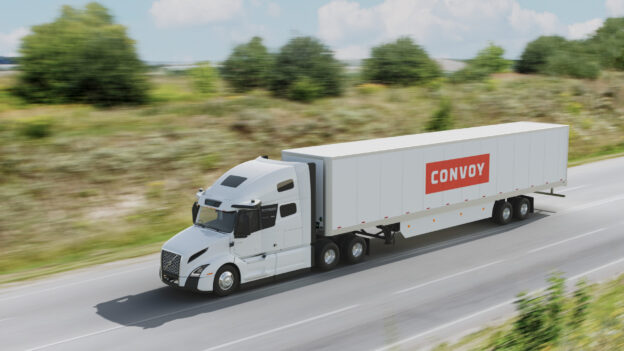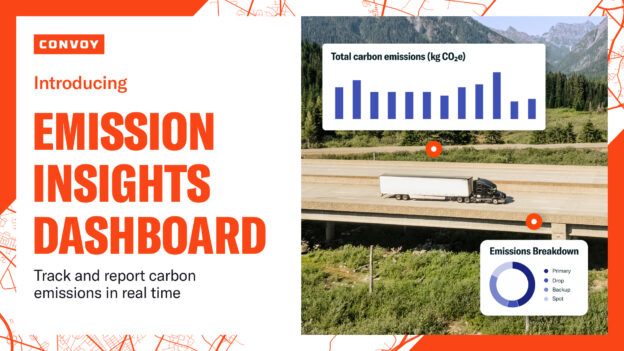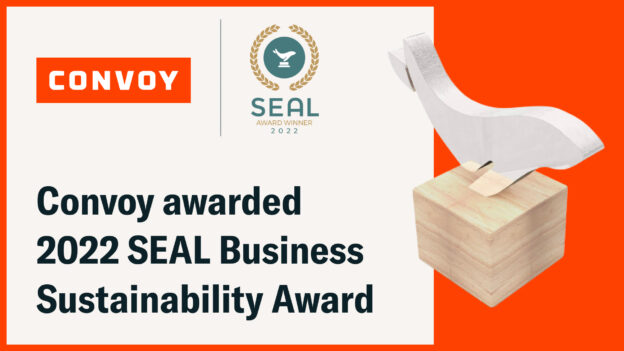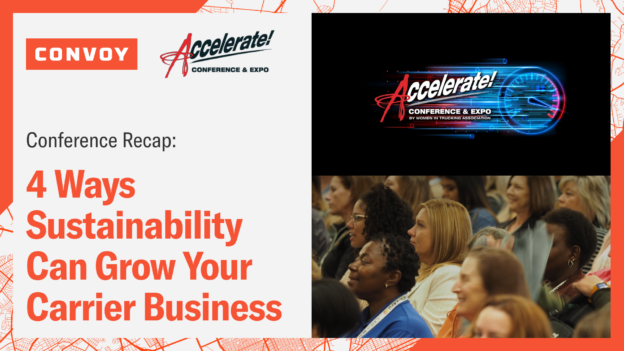Scoring Big By Investing In The Local Community With Seattle Seahawks David Young
Sustainability • Published on June 2, 2021
We’ve talked a lot about the three pillars of sustainability: people, planet, and profit. And when you focus on the people, quite often, the emphasis is on the local community where you do business. Sustainable support for the local community can come in many ways including ensuring the organization’s operations are not negatively impacting the local environment and that the people of that community are supported and looked after in a variety of ways as well.
It was my great pleasure to talk about sustainably supporting the local community of Seattle with David Young, Chief Operating Officer at Seattle Seahawks, the professional NFL football team located right here in the Emerald City.
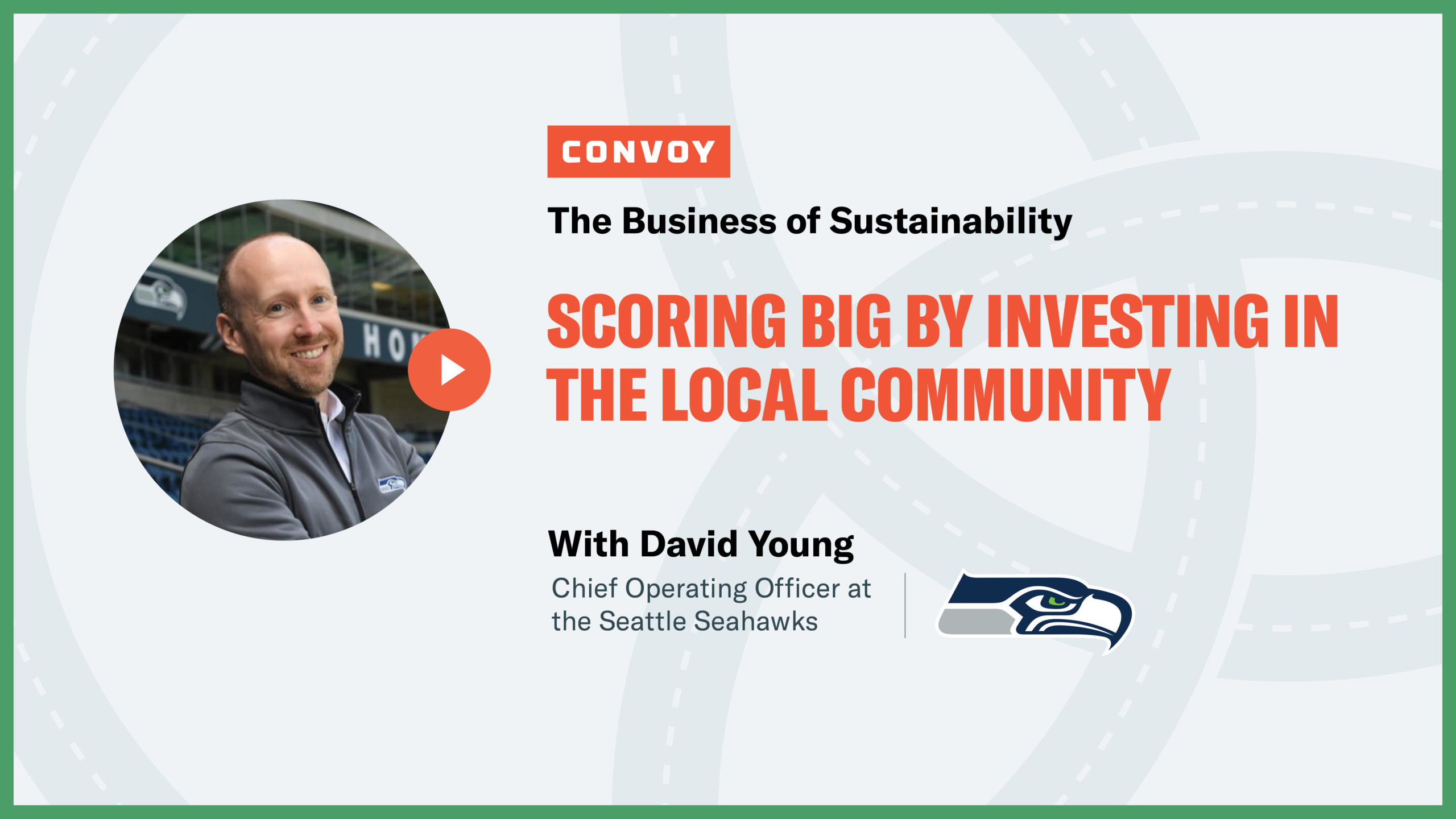
David provided some behind-the-scenes strategies as to how his team addressed starting up a sustainability effort, tactics to manage upfront costs, creating truly closed loop composting recycling programs, seeking the buy-in of key partners, and so much more. His valuable play-by-play follows.
- How We Set Our Sustainability Goals For Lumen Field And The Seattle Seahawks: Giving back to the community and being a part of the community is just natural. It’s core to who we are and our mission. And living in a progressive place like Seattle and the state of Washington where we have such pristine natural beauty, you want to protect that and it’s just the right thing to do. Given the fact that on Seahawks’ game day, Lumen Field becomes one of the largest cities in the state of Washington — if you think about it that way — 70,000 people, three to four thousand support staff — we have to operate like a city and think about the impact of those events and the other 174 events that happen in the field. It’s a big impact. Coupled with the fact that we are such a big brand, we have to take this responsibility very seriously. When we set our goals and looked at doing this in 2006, we tried to look at how we can divert waste. That’s the lowest hanging fruit and is certainly for most organizations and most people getting into sustainability. We took a look at how we could do that and then set some targets for ourselves on waste diversion. One of the key metrics that we use is our waste diversion rate. We didn’t really have a big diversion rate at the beginning, but added programs through the year. I’m so proud to say that our waste diversion rate has been over 95% for the last several years — that’s through a combination of efforts and building on itself ever since 2006 and we’ve been able to maintain that. So, by some definitions, we’re effectively zero waste at our facility with only 5% or less of all the waste coming out of Lumen Field going to landfill. (2:24)
- Two Favorite Sustainability Initiatives: The first one that we’ve been doing for a little while is our sustainability game and we’ve informally called it our potato game. We’ve got a tremendous partnership with Cedar Grove, who is our compost hauler. They have a farm, and we send our compost to them, they take it to the farm, and they use that compost across their whole farm, but there is one portion of that farm that is dedicated to Lumen Field and we get the vegetables back out of that piece which are consumed in salads and other items that we make for game days and other events so it’s really a closed loop composting cycle there. So, you can eat a hotdog, throw part of it away, it’s going to be used to create lettuce or carrots that you’re going to eat next year or in the next game in a salad. Every year we have a sustainability game and at that game — we plant potatoes early in the year in the cycle — and then when we get to that game, every potato — including potato chips, french fries, even potato salad — every potato that is served is organically and sustainably grown on the farm for that game. Another program is something that we actually just started recently. As a part of Earth Day last month, we hosted one of these volunteer days and partnered with Green Plate Special, which is a local non-profit that has community gardens and they help out and work with students in middle school and high school focusing on gardening and cooking skills. So that’s really important to us, it makes an impact on youth, which is another one of our pillars in our community: outreach programs. (5:26)
- The Importance Of Focusing On Local Initiatives: As we take a look at sustainability, there are really four components to it. There’s the waste diversion, energy and resource conservation, food, and people. You need people to make all that work, but you can focus on people as well as a part of your overall sustainability strategy. And to us, local is a big part of that both from the resource conservation perspective and the environment. The less fuel that is used or expended in transporting your food and transporting goods, the better off we all are. The more local it is, the fresher food you’re going to get. And then also just great to be giving back into the community. It’s that people pillar. That fourth pillar of our programs, when we take a look at some of our programs, we have a community concessions program at the stadium where we bring in local restaurants and fresh foods to serve and be vendors at the stadium, which is tremendous to our fans because it provides variety. Buying from local farms so that we reduce your impact on the environment, reduces the carbon footprint. It’s just incredibly important to us. And because we are the Seattle Seahawks, we want to represent our local businesses, and local to us doesn’t just mean Seattle and western Washington, we look to eastern Washington as well and our stadium was built by the people of the state of Washington. We recognize we pull from eastern Washington too, whether it’s wineries, food producers, or other vendors, we look to the whole state to stay local. (8:48)
- How Sustainability Is Integrated Across Multiple Teams At The Seattle Seahawks: This is the key to the whole program. You have to have buy-in across the board. From the top levels of the organization, it has to be a priority, all the way to your front-line workers and then across all your partners as well. It was extremely important to us in the process that we find a partner that aligns with our vision overall and a big part of that vision was continuing sustainable sourcing, humanely-raised proteins and animals, sourcing organic vegetables, and making sure what we serve is the highest quality. Really ensuring that everyone from the beginning has bought in. It isn’t just a department. It isn’t just a facilities team putting recycle bins in offices or around the stadium. We’ve got to have an all-in mentality here and crafted that with a committee of individuals across our organization. A cross-functional committee that wasn’t just people from the Seahawks and First in Goal, which is our department of our company that manages the stadium. It was a representation from all of our vendors as well and all of our partners. (11:25)
- The Most Challenging Part In Achieving Our Sustainability Efforts: Starting. Getting off the ground. Once you build that momentum, it starts to build on itself and you just see the benefits to it. So, getting the initial program off the ground between 2006 and 2009 was probably the most challenging part. And when you’re building a program like this, anything new is always going to be facing challenges. Anything new that could look like it’s going to add incremental cost, is going to present a lot of challenges. This program as we got it off the ground and found that buy-in, like I said, just built on itself. And as we pivoted from the waste diversion into utilities, that was another challenge for us because there is upfront cost in some of the retrofits, some of the additional installs that we had to do at the stadium to install low-flow water valves for example. We put a solar array on top of our events center, which, at the time, was the largest in the state of Washington. It generates over 830 thousand kilowatt hours of electricity and provides about 23-24% of our overall electricity needs at the stadium. So, once we got over those hurdles of the initial capital outlay, we started realizing benefits and savings afterward. If I could offer advice to anyone starting a large-scale program like this is look at the long term returns and benefits you’re going to have. Not just in the case of financial benefit — which we reduced our overall cost on utilities by about 21% with many of the measures we put into place since 2010 — but also the benefits. (14:18)
- What Every Fan Should Know When They Are Cheering On The SeaHawks Or Walking Through The Doors At Lumen Field: What I would hope they take away is that sustainability is something that can be seamlessly integrated into your life and not create too much additional burden or strain. Everything we do is seamless for our fans and behind the scenes. What we’ve done is make it simple by everything that comes out of a concession stand, anything that one of our guests can touch is either recyclable or compostable. So, food service items, the containers that they come in, all compostable. We switched to paper straws a few years ago, obviously all compostable. So, the fan doesn’t have to think about it. You just put all of your food products into the compost bin and take your can and put that in the recycle bin and you’re done with it. That’s the biggest thing to take away. With a little bit of forethought and planning, you can make this experience seamless and it’s really not any different than your everyday life right now and you’re doing some good for the community and for the planet. (16:48)
Jennifer: Tell me about you role and responsibilities as the chief operating officer of the Seattle Seahawks.
David: Sure. What it means is I get the privilege of working with and leading an incredible group of individuals that are responsible for a broad range of what we do here at the Seahawks from the stadium at Lumen Field and the event center at Lumen Field Event Center along with the theater. Together that complex is one of the busiest event complexes in the country and third busiest in the NFL. And it’s actually the largest event venue of its kind in the northwest and certainly within the Seattle area. We host, in a typical year, this has been anything but a typical year, we host about two and half million visitors every year and 175 events. Hoping to get back to that real soon and then I also get to work with folks on the team side managing retail. We have two pro shop locations located around the Seattle area as well as our marketing community outreach departments and a few other things that from time to time I get involved with.
Jennifer: Sustainability is core to Lumen Field, the Seattle Seahawks, how do you set your sustainability goals and commitments?
David: To us, giving back to the community, being a part of the community is just natural. It’s core to who we are and is in fact, one of our pillars of who we are and our mission. So, it just makes sense and especially living in a progressive place like Seattle, like the state of Washington where we have such pristine natural beauty, you want to protect that and its just the right thing to do. And given the fact that on Seahawks game day, Lumen Field becomes one of the largest cities in the state of Washington if you think about it that way. 70,000 people, three to four thousand support staff, including myself there on Seahawks game days, we have to operate like a city. And think about the impact of those events and the other 174 events that I just told you about that happen in the field, it’s a big impact. And couple that with the fact that we are such a big brand. We are, as the Seahawks, looked to as a role model. And we have to take that responsibility very seriously. So, when we set our goals and we took a look at doing this all the way back in 2006 is really when we started our sustainability programs, we tried to look at how we can divert waste. I think that’s the lowest hanging fruit, it was for us, certainly for most organizations and most people that are getting into sustainability. How do we do that? We all have recycle cans at home, so it’s pretty familiar to us. So, we took a look at how we could do that and then set some targets for ourselves on waste diversion. One of the key metrics that we use is our waste diversion rate and we started out and, you know, didn’t really have a big diversion rate at the beginning but adding programs through the year, I’m so proud to say that our waste diversion rate has been over 95% for the last several years. And that’s through a combination of efforts and building on itself ever since 2006 and we’ve been able to maintain that. So, by some definitions, we’re effectively zero waste at our facility with only 5% or less of all the waste coming out of Lumen Field going to landfill.
Jennifer: What is your favorite initiative that you or your team is working on right now?
David: There are so many, and this is part of the business that really excites me just because of the good that it does. But there’s two that I’ll tell you about that are super exciting. One that is brand new and one we’ve been doing for a couple of years. The first one that we’ve been doing for a little while is our sustainability game and we’ve kind of informally called it our potato game. You’ll figure out why in just a second. We’ve got a tremendous partnership with Cedar Grove, who is our compost hauler. They have a farm, and we send our compost to them, they take it to the farm, and they use that compost across their whole farm but there is one portion of that farm that is dedicated to Lumen Field and we get the vegetables back out of that piece and are consumed in salads and other items that we make for game days and other events so it’s really a closed loop composting cycle there. So, you can eat a hotdog, throw part of it away, it’s going to be used to create lettuce or carrots that you’re going to eat next year or in the next game in a salad.
To highlight that, every year we have a sustainability game and at that game, all of the potatoes, we plant potatoes early in the year in the cycle, and then when we get to that game, every potato, and if you can imagine at a football game, potato chips, French fries, right, even potato salad, there’s a lot of potatoes. So, every potato that is served is organically and sustainably grown on the farm for that game. So, the french fries look a little bit different, right? They’re not those beautifully cut, industrial cut fries, but they’re compost grown, they’re organically grown, and they’re sustainably grown and it’s a way that when folks get their hamburger with their fries or hotdog with a side a fries or potato chips that we’ve made in house, they notice that and they ask, “What’s going on here with these different french fries?” And then we have programming throughout the game that highlights the rest of our sustainability programs and most importantly, educates our fans on what they can do to make some changes in their own daily life to support sustainability. Another program that we’re doing right now is something that we actually just started recently is a program, we have some volunteer programs that we do with our staff and I’m trying to pull this up, so I don’t get it quite…so I make sure that I tell you exactly what we’re doing here because its super cool and important here. But what we’ve done is, a part of Earth day last month, is we hosted one of these volunteer days and partnered with Green Plate Special, which is a local non-profit that has community garden and, you know, they help out and work with students in middle school and high school, you know, focusing on gardening, cooking skills. So that’s really important to us, it makes an impact on youth, which is another one of our pillars in our community outreach programs. But it also helps our sustainability programs as well.
Jennifer: I really love that you highlight a local lens with all of your different sustainability programs whether it’s a local composting company or like you mentioned, helping the youth, just with the local communities. I think that’s such an important aspect of sustainability to support your own community in that way.
David: It really is, absolutely. You know, as we take a look at sustainability, there’s really four components to it. There’s the waste diversion, there’s energy and resource conservation, there is food which we can talk about as well, and then there are people, right? You need people to make all that work, but you can focus on people as well as a part of your overall sustainability strategy. And to us, local is a big part of that both from the resource conservation perspective and the environment. The less fuel that is used or expended in transporting your food and transporting goods, the better off we all are. The more local it is, the fresher food you’re going to get. And then also just great to be giving back into the community. Its that people pillar. That fourth pillar of our programs that, you know, when we take a look at some of our programs, we have a community concessions program at the stadium where we bring in, and this is hyper local, this is just for the three neighborhoods adjacent to the stadium. So, the ChinaTown International District, Pioneer Square, and Soto…bring in restaurants and fresh foods to serve and be vendors at the stadium, which is tremendous to our fans because it provides variety. You can get more than just a hotdog, you can get pai tai, you can get Indian food, all kinds of diverse foods, and great foods, and honestly, those carts are some of our highest rated food options in the stadium and they are hyper local, right? Buying from local farms so that you reduce your impact on the environment, reduces the carbon footprint. It’s just incredibly important to us. And because we are the Seattle Seahawks, right? We want to represent our local, and local to us doesn’t just mean Seattle and western Washington, we look to eastern Washington as well and, you know, our stadium was built by the people of the state of Washington. So, we recognize that we pull from eastern Washington too, whether it’s wineries, whether its food producers, or other vendors, look to the whole state to stay local.
Jennifer: How is sustainability integrated across multiple teams that work at the Seattle Seahawks?
David: That’s a great question because that’s the key to the whole program. You have to have buy-in across the board. So, you have to have buy-in horizontally and vertically, right? So, from the top levels of the organization, it has to be a priority, all the way to your front-line workers and then across all your partners as well. And when we started this program, we had a tremendous partner, continue to have a tremendous partner on [inaudible 11:49]. They have been right there with us every step of the way in not only building this program but sustaining and making this program better. As we look to our concessions partner and our food and beverage partner, we actually operated our own food and beverage for about three years and during that time, we established food sustainability, we established some composting programs throughout our food programs and then when we back to, last year, concession partner, it was extremely important to us in that process that we find a partner that aligns with our vision overall and a big part of that vision was continuing sustainable sourcing, humanely raised proteins and animals, sourcing organic vegetables and making sure what we serve is the highest quality. And we found that in [inaudible 12:44] restaurants. And they have been a great partner with us and continuing the work that we did previously and getting us to jump off into even bigger and better things. And then you look at some of the other teams that play at Lumen Field, the Seattle Sounders. I mean, their work in the space is notable as well. So really ensuring that everyone from the beginning is bought in. It isn’t just a department. It isn’t just a facilities team putting recycle bins in offices or around the stadium, we’ve got to have an all-in mentality here and crafted that with a committee of individuals across our organization. A cross-functional committee that wasn’t just people from the Seahawks and First in Goal, which is our department of our company that manages the stadium. It was a representation from all of our vendors as well, all of our partners. And then we collaborate with the Sounders and ensure that all of our policies are being active at their matches and they’ve even gone above and beyond. Their work in space, as I said before, is tremendous and I can’t applaud them enough for what they have done with our program and their own as well.
Jennifer: What has been the most challenging part in achieving some of your sustainability efforts?
David: To me it was starting. It’s getting off the ground. Once you build that momentum, it starts to build on itself and just see the benefits to this. So, getting the initial program off the ground back between, you know, 2006 and 2009, was probably the most challenging part. And when you’re building a program like this, anything new is always going to be facing challenges. Anything new that could look like it’s going to add incremental cost, is going to present a lot of challenges. This program as we got it off the ground and found that buy-in, like I said, just built on itself. And as we pivoted from the waste diversion into utilities, that was another challenge for us as well because there is upfront cost in some of the retrofits, some of the additional installs that we had to do at the stadium to install, say, low-flow water valves. We put a solar array on top of our events center, which you don’t think about solar power when you think about Seattle for sure. Today is a beautiful day but we typically don’t see the sun for a while in the wintertime. But that solar array at the time, was the largest in the state of Washington. Generates over 830 thousand kilowatt hours of electricity and provides about 23-24% of our overall electricity needs at the stadium. So, once we got over those hurdles of the initial capital outlay, we started realizing benefits and savings afterward. So, what I would say, and I think if I could offer advice to anyone that is starting a large-scale program like this is look at the long term. Look at the long term returns and benefits you’re going to have. Not just in the case of financial benefit, which we reduced our overall cost on utilities by about 21% with many of the measures we put into place since 2010. But also, the benefits, if you’re in my kind of business, the fans, right? Your constituents, or on your employees or your business overall and just what good you’re doing for them.
Jennifer: What should every fan know about sustainability when they are cheering on the Seahawks or walking through those doors at Lumen Field?
David: What I would hope they take away is that it is something that can be seamlessly integrated into your life and what you do and really not create too much additional burden or strain on you. You know, everything that we do is seamless for our fans and kind of behind the scenes. You can walk through Lumen Field and I will challenge you to find a trash can, a can that is marked trash that will go to landfill. There are on the concourses, about three or four of them. That’s not a lot when you’re talking about a building that can hold 70 thousand people but there are a couple of them. So next time you’re at Lumen Field, next time anyone who is watching this is at Lumen Field, walk through and try to find those three or four cans. But located throughout the concourse, throughout the building, are hundreds of composts, recycling bins all throughout the building. And what we’ve done is make it simple by everything that comes out of a concession stand, anything that one of our guests can touch is either recyclable or compostable. So, food service items, the containers that they come in, all compostable. We switched to paper straws a few years ago, obviously all compostable. So, the fan doesn’t have to think about it. You just put all of your food products into the compost bin and take your can and put that in the recycle bin and you’re done with it. So, I think that’s the biggest thing to take away. With a little bit of forethought and planning, you can make this experience seamless and it’s really not different than your everyday life right now and you’re doing some good for the community and for the planet.
Jennifer: Thank you again so much for joining us today, David.
David: Yeah, of course. Thanks for having me. It’s been great. I love talking about sustainability and the things that our team has done over at Lumen Field. Really proud of them and what they’ve done and really excited to see what else we are able to do later on this year when hopefully we’re able to welcome fans back to Lumen Field.
